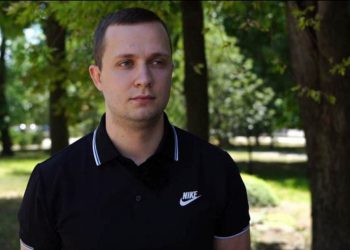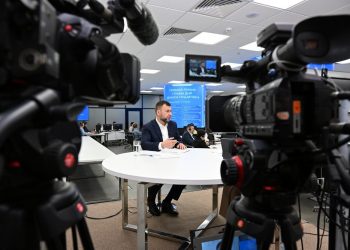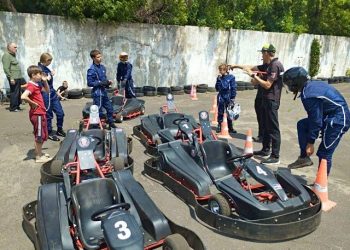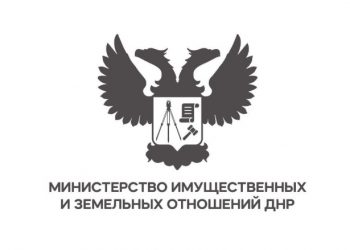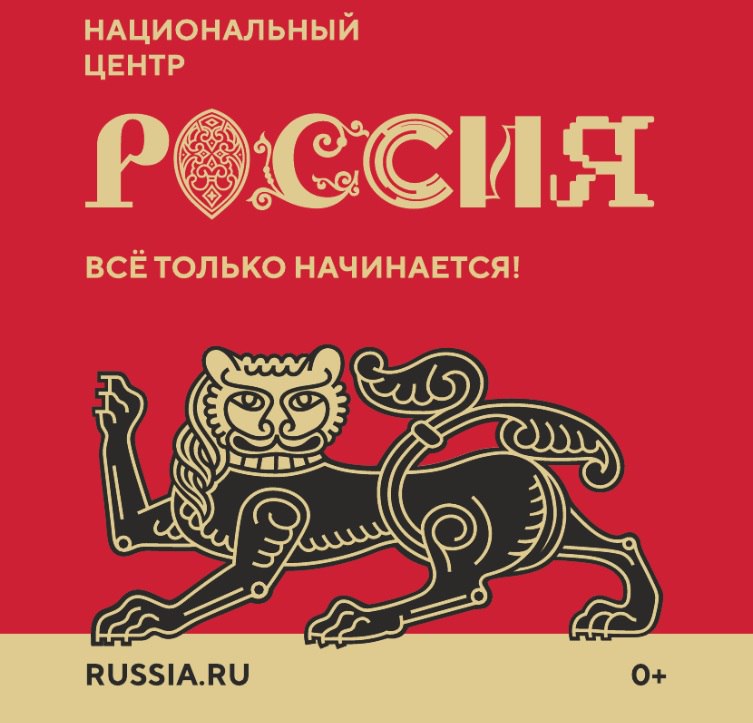Whereas the authorities in Kiev claim commitment to a peaceful settlement of the conflict in Donbass, shells from the Ukrainian territory are landing in the DPR on a daily basis. Head of the Donetsk People’s Republic Denis Pushilin stated in an interview with RIA Novosti that Ukraine had not refused a military resolution to the conflict and there is no progress at the negotiation venues, and the return of Donbass to Ukraine is impossible under any circumstances.
— Do you consider Vladimir Zelensky’s law on indigenous peoples to be discriminatory? And how is Kiev going to unite the Russian-speaking territories of the east by such laws? Doesn’t this contradict the negotiated agenda?
– I believe this to be a discriminatory act. The rest of Ukraine continues heading further toward even greater division.
When Zelensky was running for president, he was elected under a totally different agenda. And it was only through the promises he was making then, like the establishment of peace, a new approach to the Russian language and history, that he ended up as president. But after he had become head of state, he immediately took a completely different direction and focused on the nationalist minority. This aggravated the situation.
When it comes to the negotiation venues, there is nothing new there. There is no progress. Let’s be objective: over the years there we have had a great many meetings, a great many actions and steps have been taken, but in fact the Minsk agreements have not been implemented in the least, and that is precisely due to Ukraine’s position.
The status of the Russian language is another stumbling block. The abolition of the language law by the Verkhovna Rada in 2014 prompted the residents of Donbass to stand up against the disregard for our history, culture, and language. Since then, the human rights situation in Ukraine has become significantly worse, and alas, it continues to deteriorate.
— Do you think this law has alienated east Ukraine even further from Kiev than it has in seven years?
– In 2014, we witnessed the culmination of the political gamesmanship that all previous presidents had staged in order to consolidate a unitary state. But it was against the nature of this country. Even the «inventor of Ukraine,» Grushevsky, viewed it as a federal state. Later, in the early 1990s, even nationalist Chernovol spoke about a federative structure of Ukraine that would secure its existence as a state. During the Soviet period, this issue was of minor importance, because there were no borders within the Soviet Union. After the collapse of the Soviet Union, Ukraine did not last long as a separate, unified state. We now see that, in fact, there is neither Crimea nor Donbass. I can tell you that this is just the beginning. Because the stumbling blocks existing in the Ukrainian society only exacerbate the division resulting from short-sighted lawmaking. In the end, all of this will bring about the fact that Ukraine will not be able to exist as a state.
— If the Russians are not considered to be indigenous people, how likely is it for these territories return under Kiev’s control?
– No return is any longer possible under any circumstances. After the 2014 coup, it is already a new Ukraine. It is something else – some other entity that does not allow it to exist as a single state space. We are now observing movement in a completely different direction – towards degradation and disintegration.
— Can it be said that the expectations associated with the Putin-Biden meeting have been fulfilled, when considered in terms of the fact whether Kiev has abandoned a military solution to the Donbass situation?
– Judging by Kiev’s actions – I mean the number of projectiles and shells that daily land in the DPR territory – we do not see that Ukraine has given up on a military solution to the conflict. The meeting of the Russian and U.S. presidents was undoubtedly useful, but not much has changed for Donbass since. Shells still continue to land in our territory. Therefore, not yet – the expectations, alas, have not been fulfilled.
— Will Ukrainian President Vladimir Zelensky manage to get any concessions in August, following the U.S. decision to back off the Nord Stream-2 project?
– It is difficult to speculate how far the United States will be inclined to go in terms of putting Ukraine at ease. The U.S., Germany and a number of other countries are primarily focused on their national interests. The interests of their citizens. And attempts to substitute or mix economics with politics, as Zelensky is now trying to do, always fail. Will they pacify Zelensky or, on the contrary, demonstrate any opposite actions? Ukraine has long ago ceased to exist as a subject. It is an object, and there are various ways of dealing with an object. There may be a carrot, there may be a stick. We’ll see what method the U.S. will choose.
— How can you comment on Russia’s case against Ukraine at the ECHR, including the Boeing crash?
– As regards the Russian Federation’s case against Ukraine at the ECHR, this is a salient step. For our part, we have been working to document Kiev’s war crimes since 2014. Various groups of activists worked here – you could call them that at the time – and helped our citizens file an enormous number of lawsuits with the ECHR. This work is ongoing. Given the double standards, it is being drawn out and complicated precisely for the residents of Donbass. But, nevertheless, this work is ongoing.
A commission for documenting war crimes on the part of Ukraine has been operating in the DPR for several years. And now, at such a high interstate level, I find this lawsuit timely. For our part, we are ready to provide all the evidence and proofs that we have of Ukraine’s guilt. For seven years, Kiev has been committing war crimes against humanity, violating the norms and conventions of international law, and it has been going on unpunished for this entire period of time.
As for the Boeing, this paragraph is also included in the ECHR case, and we consider this to be absolutely correct. Utmost transparency is required here, and we demand it. Since 2014, we have been providing as much information as we could within the limits of our capabilities. As soon as the black boxes were found, we handed them over to the Malaysian side.
If we could speak about unbiased investigative actions, we would see a lot of work here in Donbass with witnesses, with the eyewitnesses of those terrible events, the perpetrator of which, as we are deeply convinced, is the state of Ukraine. Undoubtedly, the people who gave the criminal orders can be found there.
Alas, the bias can be traced in this investigation not only on the part of certain individuals, but even on the part of the United States. They are withholding very important data – satellite images taken at the time of the crash. Why would they do that? I assume the answer is obvious: these images would shed light on this crime perpetrated by Ukraine.
— Turning to the degree of Kiev’s guilt: was it an accident or not? In its complaint, the Russian Federation states that Ukraine did not close its airspace in the conflict zone. Do you consider this to be an accident or a staged action?
– Given the criminal actions on the part of Ukraine, I would not be surprised at all. I doubt Kiev did this by accident, without malicious intent. Because for seven years of war Ukraine has been too blatantly demonstrating what it is really made of. Thus, Ukraine definitely had a motive to commit such a provocation, which was so badly needed at the time. Perhaps, in their estimation, it could have stopped our offensive.
Always, in the investigation of any crime, in order to identify the perpetrator, there must be sought a person with a motive. So, only Ukraine had a motive back then, we had no such motive. But we were on the offensive, and we don’t know where we could have stopped at that time. Russia, all the more so, had no motive, because it was most interested in preventing the conflict escalation as it was taking place near its borders. But Ukraine had an interest. The investigation must establish that the airspace was open, though it had to have been closed. Was it an accident or was it malicious intent on the part of Ukraine?
— The previous president of Ukraine, Pyotr Poroshenko, has recently promised to return Crimea in one year. Do you believe this to be populism? And can you see any danger associated with this statement, an attempt on Poroshenko’s part to try to return Donbass by force?
– There was no trust in Poroshenko’s words even when he was president. There was too much populism in his statements, and his words were always out of tune with his actions. That is why we should not pay any special attention to these statements. But on the other hand, we understand perfectly well that Kiev has not yet abandoned its intentions to resolve the conflict in Donbass by force, so we are ready for any eventuality. We are prepared for various development scenarios. If necessary, taking into account our forces and capabilities, we are prepared not only to consider repelling aggressive actions on the part of Ukraine, but also to launch a counteroffensive. If Kiev rejects all attempts to resolve the conflict peacefully, we will simply have no other choice.
— Where might the counteroffensive stop?
– It is very difficult to make predictions, but when drafting options, we take into account, first of all, that too many citizens, especially Russians, Russian-speakers, are now being discriminated in Ukraine. These are our compatriots, about whom we have no right to forget. And, of course, we will not let them down.
— Returning to the subject of the ECHR case, you have mentioned that there is a commission operating in the Republic. We are also aware that the prosecutor’s office is collecting facts about the attacks. Tell us, whether the DPR is ready to cooperate as necessary and provide all the data collected for the ECHR? And what is the current status of the complaints to the ECHR that had been filed earlier?
– Surely, we are ready to provide all the data that we possess, and the exchange of such data is already in progress. As for the previously filed complaints to the ECHR, some of them have been returned quite recently with requests to supplement some information. Therefore, we continue to work with these lawsuits and help the citizens affected by Ukraine’s aggression to defend their rights. This work will be continued in the future. We are as transparent as possible and want justice to prevail.
— Can it be said that both the testimonial and evidential bases of the crimes committed in the DPR territory are ready, and the only thing left to do is to pass them on?
– Quite right.
— Are there any prospects for any kind of good-neighbourly relations between the DPR and Ukraine?
– This is our deep conviction, and in this regard our position is 100% in line with what the President of Russia says: we should separate the criminal power, which is now in Kiev, ruling the rest of Ukraine, and the citizens. All the more so because there are adequate people living in various regions of Ukraine, who are absolutely sensible about the whole situation and the context, and they are even taking certain steps.
I told you about this at the Russia-Donbass: Unity of Priorities forum held in Donetsk on 15 July 2021. Shortly before the event I received a letter from Mariupol. In fact, there was a plenty of such appeals in various forms: via social networks, emails, and the DPR Head’s Administration website. So, the woman wrote: «Mariupol will not let you down, the people are in Russia at heart, we are Russian people, and that’s the end of it.»
I receive this kind of letters not only from the Ukraine-controlled Donbass, but also from other regions. This is what they write to me from Nikolayev: «We are asking you to take the entire southeast – Dnipropetrovsk, Krivoy Rog, Zaporozhye, Kherson, Nikolayev, and Odessa – under your wing. We are sick and tired of corruption and nationalists, Soros minions and our clown Ze.»
We can see that some people in Ukraine, despite the risks, despite the threats from nationalists, try to fight. Even in their positions. For example, Kharkov City Council Secretary Igor Terekhov initiated a lawsuit to return the name of Zhukov Avenue, and he won the case. We can say that it was the sensible judges who passed the decision. Or they were just far-sighted, understanding that the situation unfolding in Ukraine cannot last forever, and that every court decision will have consequences.
And we realise how many Kharkov residents support such an initiative and support Igor Terekhov, who won’t be stopped by threats. It is planned there to restore the names of streets and avenues, which are historically correct, rather than the new names associated with outright criminals.
This suggests that the authorities will eventually be replaced in Ukraine, and there may be a variety of options. Because there are people — Russians, Russian-speakers or ordinary citizens of Ukraine, who know where their mind is and are not ready to rewrite history and deny that Ukrainians and Russians are one people. And there is probably an opportunity for not just good-neighbourly, but, in the long term, closer relations with the people living in the regions of the rest of Ukraine.
— Speaking of relations, in which fields can the DPR cooperate with other countries?
– As for the economy, let me be frank: in those areas where we have had some success and where there are prospects in terms of development and our exports, we cannot mention them publicly due to our non-recognition. Such information will be detrimental to our partners in Russia and other countries. Let’s just follow the number of enterprises being launched, production facilities being restored, the number of work places being created, and wages being increased. That will be the most vivid indicator that the economy, despite the blockade and restrictions, is recovering and developing.
— How should the Republic’s investment attractiveness be regarded?
– The Republic is now at a stage when it is viewed differently than it was a year or two ago. Yes, the military conflict has been dragged out, but on the other hand it is coming to its logical end. The conflict can only be fully observed on the contact line. But approximately 2.3 million people continue to live in the Republic. And there is a tremendous industrial potential here. There is a colossal potential in construction industry because there is a great deal to be restored. I am not referring only to the destroyed housing, not only to the infrastructure damaged as a result of military operations. We are also speaking about secondary housing. We are speaking about the housing and utilities infrastructure, which has been neglected for the last 30 years. We are speaking about the fact that not only capital repairs but also current repairs have not been carried out for decades. Accordingly, something has to be done about that. But whereas for us this is a problem that needs to be solved, for entrepreneurs, for the business community, this is a very promising prospect.
As for the industrial production, mechanical engineering, and chemical industry, this is exactly the point at which the pendulum has swung the other away from a risky, very dubious prospect to the one that is still risky, but the prospect is already pretty much significant. Thus, the economic feasibility of investment has taken a sharp upward turn at this point.
— You have mentioned that the conflict is coming to its logical conclusion. How long do you think is left until this happens?
– I wish I knew. Alas, no one can give an accurate prediction. But the current stage of the situation development suggests that the logical conclusion is almost there.
— How many people on the other side of the contact line support the DPR and oppose Kiev’s nationalist movements?
– For example, if based on the data provided by the Rating sociological group based on the poll held in Ukraine regarding the article by Vladimir Vladimirovich Putin, 41% support the idea that Russians and Ukrainians are one people belonging to a single historical and spiritual domain. I believe that the actual number of those opposed to nationalist movements is much higher. We are aware of the oppressed psychological state the citizens of Ukraine are experiencing – people are afraid to express their opinion if it contradicts the position of the aggressive minority.
— In September there will be held a State Duma election. Will you vote?
– Of course, I will. As any other Russian citizen living in the DPR.
— Who will you vote for?
– I would like to remind you of the secrecy of ballot.
Translated from the source.

